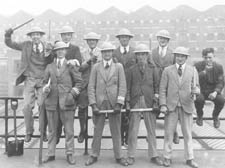|
|
 |
| |

Undergraduates and office cadets were encouraged to volunteer as special police constables |
The nine days of class war that shook Britain
The melodrama and propaganda of Winston Churchill changed the tide of the General Strike, writes Illtyd Harrington
The nine days between May 3 and 13 of 1926 were momentous ones when three-and-a-half million organised workers out of a 19 million-strong workforce stood up the worst elements in Prime Minister Stanley Baldwin’s Tory government and challenged the greed of the coal owners.
This was the General Strike, the causes of which had fermented in the post war years from 1921 when dockers, miners and railwaymen flexed their muscles in a Triple Alliance. It proved a fragile experiment in unity but it forced a government subsidy of £24 million pounds which made it possible to provide relief for the miners’ wages to be subsidised.
A belligerent Churchill as Chancellor saw it as a surrender in the class war. His megalomania and recklessness flourished during this period of the General Strike and was unbridled. To him it was a signal for revolution inspired by the victory of Russian Communism aided by British supporters. To him, Baldwin, his boss, was a “turnip”. Nervous Labour MPs led by the ex-rebel and first Labour Prime Minster, Ramsay MacDonald, trembled at what they saw as a challenge to Parliamentary democracy, edging themselves closer to the establishment to effect a mutual identity.
A rag-bag of neo-fascist and deranged retired generals were taking charge of the security services and urged the suppression of the British Communist Party.
Moderate opinion, including the Royal Commission headed by Lord Sankey, a judge, had proposed nationalisation of the mines in 1921 but by May 1926 the right wing had declared a class war.
Monseigneur Ronald Knox a Roman Catholic humourist in a weekly radio programme spoke of a “riot in central London” where the workers spit roasted a well-known philanthropist. Incredibly 200 listeners rang in to ask for confirmation.
The Daily Mail as usual laid into the workers and the miners. Sadly their venom soured as it coincided with the Duke of Northumberland’s annual receipts for all his “mineral rights” on his land. He received £73,000, many millions in today’s prices and hard even for the Mail to justify.
Anne Perkins, a leader-writer on the Guardian, goes through these nine days as they slowly unfolded often in mutual confusion. The union leaders hammered out a national organisation while others argued for local soviets.
Here Earnest Bevin, the founder of the Transport and General Workers union, emerges as the dominant personality. A future Foreign Secretary, in 1945, in 1926 a class warrior, a match for the rampaging Churchill.
As well as editing the government newspaper, Churchill was Chancellor and arch intriguer against his own Prime Minister. “Commandeer the BBC” he cried, frightening his less bellicose friend. In the middle of this he was embarrassed when a coal owner left £93 million at 1926 values while the ungrateful miners objected to working longer for less pay.
A Tory MP who was also a lawyer casually declared that the strike was illegal, an empty claim endorsed by a right-wing judge.
Perkins deftly paints the leading players: King George V, the Archbishop of Canterbury, the ubiquitous Sir Herbert Samuel as well as Harry Pollitt, the silver-tongued leader of the Communist Party.
One of the two communist MPs Saklavalta, went to jail for sedition. A London magistrate sentencing strikers said curiously: “Women must be treated in the same way, because they influence men’s passions.” A thousand members of the Communist Party went to jail.
Churchill melodramatically organised an armed convoy to the London Docks to carry back flour. Tanks appeared, not on the lawns, but in the streets, and machine guns were hidden along the routes.
The leader of the Roman Catholics cardinal Bourne, in a rare memorable phase with little effect on his striking flock, proclaimed “The strike is a sin against God.”
Baldwin and his wife Lucy had daily conversations with the Almighty but he only allowed Churchill to go so far and gave special police constables five shillings a day, double what the miners were asked to take.
Perkins has uncovered the smug diary of a 15-year-old, one Margaret Wood, a draper’s daughter from south London, where she shows her contempt for the working classes. The child’s cold prose is intriguing.
Defeat when it came was bitter. The miners, led by the fated Arthur Cook, soldiered on for six hard months.
Labour moderates breathed a sigh of relief. They had not dirtied their soft pink manicured hands and the red flag and the smell of cordite were thankfully no longer in the air.
Almost at once, with characteristic shrewdness, Baldwin introduced a national energy grid, a form of nationalisation, he made proposals for better housing and improved housing for the workers.
Twenty years later the pits were nationalised amid national celebration. A massive national guilt remained about the miners until the 1980s when Thatcher talked of them as “the enemy within”.
Perkins’s history is easier to read than many of the tortuous histories of those nine days. Unlike the American John Reed, who wrote 10 days that shook the world, our British nine days were a rumble.
Her conclusion will not sit easily on old lefties, like me. She writes. “New Labour is the party Ramsay MacDonald dreamed of creating”.
Indeed, has she forgotten that he formed an alliance with the Tories and eagerly reduced most forms of social welfare and tried to take money back from war pensioners. |
| |
|
 |
|